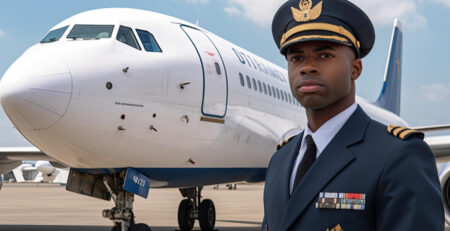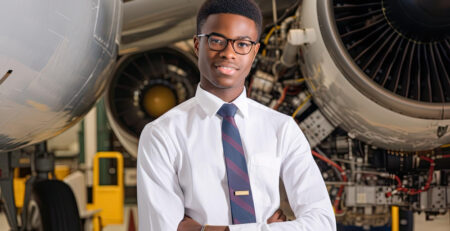A Glimpse into the Exciting Industry of Aviation
AeroTechnics Team2024-08-27T15:57:49+03:00Notable Aviation Jobs Around the World: A Glimpse into the Exciting Industry
The aviation industry is a vast and dynamic field, offering a wide range of exciting and rewarding career opportunities. From piloting majestic aircraft to designing cutting-edge technologies, there’s a place for individuals with diverse skills and passions. Let’s explore some of the most notable aviation jobs around the world:
Join AeroTechnics for the Virtual Aviation Jobs Symposium – your one-stop shop to explore exciting opportunities in the aviation industry! ✈️
Don’t miss this chance! Seats are limited, and registration closes on September 10th, 2024!
Secure your spot today at aerotechnics.tz
At AeroTechnics Ltd, we are committed to providing comprehensive aviation services and supporting the growth of the industry. If you’re looking to start a career in aviation, we encourage you to explore the opportunities available and consider joining our team.
These are just a few examples of the many exciting career opportunities available in the aviation industry. Whether you’re passionate about flying, engineering, or customer service, there’s a role that suits your interests and skills.
Concessionaires play a crucial role in airport operations, managing and operating a variety of businesses, from restaurants and gift shops to coffee houses and brand stores. Their services are essential for travelers seeking refreshments, souvenirs, or a comfortable place to relax before their flights.
While concessionaire positions often offer hourly wages and may not pay significantly above minimum wage, they can be rewarding for those who enjoy interacting with people. These jobs provide opportunities to meet travelers from diverse backgrounds and can offer flexible schedules with potential for overtime, especially during peak travel times.
Cabin cleaners play a crucial role in maintaining aircraft cleanliness and efficiency. Their responsibilities include sanitizing aircraft interiors, replenishing food and beverage supplies, and safely disposing of waste. Given the tight turnaround times between flights, cabin cleaners must work quickly and efficiently to ensure aircraft are ready for passengers.
Custodians play a vital role in maintaining the cleanliness and overall appearance of airports. While specific responsibilities may vary based on airport size, their duties generally include keeping passenger areas, such as waiting lounges and restrooms, spotless. Additionally, custodians often perform minor maintenance tasks. Although no formal education is typically required for this position, prior experience in a similar role can be beneficial.
A ramp agent is a ground crew member responsible for the external maintenance and turnaround of an aircraft between flights. Their duties include refueling the plane, facilitating passenger boarding and disembarkation, and conducting safety checks. Like cabin cleaners, they often work under tight time constraints to ensure aircraft departures are on schedule.
Ramp agents also play a critical role in runway safety. They inspect the runway for debris and remove any foreign objects that could pose a risk to aircraft engines, helping to prevent accidents and delays.
Ticket agents, often referred to as customer service representatives, are the frontline employees of airlines. They’re typically the first point of contact for passengers at the airport. Their responsibilities include checking in passengers, addressing administrative queries, and coordinating with flight dispatchers and cabin crew to ensure accurate passenger manifests.
Exceptional customer service skills are paramount, especially during flight disruptions or cancellations when passenger frustration may escalate. As the public face of the airline, ticket agents play a crucial role in maintaining a positive brand image.
Aircraft fuelers play a critical role in airport operations, ensuring that aircraft have the necessary fuel for their flights. Their responsibilities include refueling trucks and directly adding fuel to airplanes. Given the hazardous nature of aviation gasoline and kerosene, this position requires a high level of safety awareness and adherence to strict procedures. Fuelers often climb ladders or stools multiple times during each shift, adding to the potential risks involved. On average, an aircraft fueler can expect to complete around 15 refueling operations per day.
Security Handlers: Gatekeepers of Aviation Safety
Known in the United States as Transportation Security Officers (TSOs), security handlers play a critical role in safeguarding airports worldwide. These dedicated professionals screen millions of passengers and their carry-on baggage each year, ensuring that only authorized individuals board flights.
While there are no formal educational prerequisites for becoming a security handler, successful candidates must complete rigorous training programs designed by their country’s aviation authority. This training often involves intensive security checks and assessments. Additionally, strong communication and customer service skills are essential for effectively interacting with passengers and maintaining a calm and secure environment.
Baggage handlers are responsible for the safe and efficient transfer of checked luggage from the check-in counter to the baggage claim area at the destination airport. While this may seem straightforward, it can involve complex logistics and challenges.
While there are no formal educational requirements, physical fitness is essential for this demanding role, which often involves heavy lifting and manual labor.
Airfield operations specialists play a crucial role in ensuring aircraft safety during take-offs and landings, much like aviation safety inspectors. They oversee the implementation of airfield safety procedures and maintain constant communication with air traffic control. This often involves balancing the coordination between air traffic controllers and ground personnel to ensure smooth and efficient operations.
Flight Dispatchers: The Unsung Heroes of Aviation
Flight dispatchers play a critical role in ensuring the safe and efficient operation of flights. Their primary responsibility is to liaise with pilots to create detailed flight plans before takeoff. These plans must take into account a wide range of factors, including weather conditions, emergency procedures, and fuel management.
Dispatchers also carefully consider the weight of the aircraft, which is influenced by factors such as cargo, passengers, and baggage. Any deviations from the planned weight can significantly impact the flight’s ability to depart or land on time. As a result, this demanding role often requires the ability to work under pressure and multitask effectively.
To become a flight dispatcher, individuals must pass a rigorous written exam and complete a specified number of supervised training hours. This comprehensive training equips them with the knowledge and skills necessary to handle the complexities of flight planning and coordination.
The allure of becoming a cabin crew member has persisted since the golden age of Pan Am in the 1960s. The glamour, free travel, and stylish uniforms make it an aspirational career path. However, the reality often involves long hours, dealing with challenging passengers, and navigating unpredictable weather conditions. The competitive recruitment process further underscores the challenges. Despite these hurdles, for those with the right temperament, a career as a flight attendant can be incredibly rewarding and exciting.
Avionics technicians are responsible for inspecting, maintaining, and repairing aircrafts’ electronics systems, either through routine inspections or when particular issues arise. With nearly every aspect of an aircraft’s management system now being electronic, this is a vital position.
As a result, you will be required to possess a relevant engineering qualification accredited by a regulatory body, such as the European Aviation Safety Agency (EASA) in Europe or the Federal Aviation Administration (FAA) US. With experience and further training, you can then explore more opportunities in the aeronautical and wider aerospace field.
Aircraft Mechanics: The Backbone of Aviation
While avionics technicians specialize in the electronic systems of aircraft, aircraft mechanics (also known as A&P mechanics) are the backbone of aviation, responsible for the overall maintenance and repair of these complex machines. Their duties encompass a wide range of tasks, including inspecting, maintaining, and repairing issues with the engine, landing gear, brakes, and other critical components.
To become an aircraft mechanic, you’ll need to invest in a similar level of education as an avionics technician. In Europe, for example, the EASA Part 66 licensing system categorizes A&P mechanics as B1 and avionics technicians as B2. This parallel in educational requirements underscores the importance and technical expertise required for both roles.
Air marshals are covert plain-clothes security operatives that provide on-flight security and counter-terrorism measures in the event of a hijack or security incident. Although they are not present on every flight, they routinely carry firearms and other weaponry onboard.
The process of becoming a marshal depends on your nationality; this is because each country has a different means of recruiting them.
In the UK, for instance, this tasking falls under the jurisdiction of the Metropolitan Police, while in the US, there is an entire government department (the Federal Air Marshal Service) set up to provide personnel.
In Israel, meanwhile, flag carrier airline El Al routinely provide their own internally trained marshals on every single one of their flights. Either way, expect to undergo several highly intensive training courses.
Airport Managers: The Gatekeepers of Aviation
Airport managers play a pivotal role in the smooth operation of airports, ensuring compliance with regulations, effective communication, and efficient personnel management. Their primary responsibility is to oversee all aspects of airport operations, from ensuring adherence to safety standards to facilitating a positive passenger experience.
While a bachelor’s degree is a foundational requirement for most airport manager positions, industry experts often recommend obtaining certification from organizations such as the National Business Aviation Association or the American Association of Airport Executives. These certifications demonstrate a specialized knowledge base and can enhance career prospects.
In essence, airport managers are the gatekeepers of aviation, responsible for maintaining a safe, efficient, and welcoming environment for both airlines and passengers. Their expertise and leadership contribute significantly to the success of the aviation industry.
Aviation safety inspectors are highly skilled professionals with a deep understanding of the aviation industry. Often with backgrounds as pilots, mechanics, or other aviation roles, they bring a wealth of practical experience to their work. These inspectors typically specialize in a few key areas, allowing them to effectively evaluate and oversee various aspects of aviation operations.
Their responsibilities include:
- Aircraft inspections: Conducting thorough inspections of aircraft to ensure they meet safety standards and are in proper working condition.
- Mechanic evaluations: Assessing the skills and competence of mechanics and other aviation personnel.
- Component repairs: Overseeing and sometimes participating in the repair of aircraft components.
- Safety audits: Evaluating the safety procedures and practices of airlines and other aviation entities.
- Operational program assessments: Reviewing and assessing airlines’ operational programs to ensure compliance with regulations and safety standards.
- Training program evaluations: Evaluating training programs for pilots, mechanics, and other aviation personnel to ensure they are effective and meet industry requirements.
Aerospace engineers study, design and manufacture aeroplanes and other spacecraft. Their job also includes learning about and coming up with new techniques to operate aircraft, rockets and even drones within the atmosphere.
Interested? Perhaps this is a role you should consider if you want to have a critical position in designing, analysing and developing aircraft.
Air traffic controllers are the unsung heroes of aviation, based in airport towers and regional/national control centers. Their crucial task is to constantly monitor air traffic and coordinate the safe movement of aircraft. This involves liaising with pilots to prevent collisions, both in the air and on the ground.
The job is demanding, requiring exceptional concentration, problem-solving skills, and the ability to remain calm under pressure. While it may seem daunting, the rewards are substantial. Air traffic controllers are among the highest-paid professionals in the industry, given the critical nature of their work.
However, becoming an air traffic controller is no easy feat. Prospective controllers must pass a rigorous selection process that tests their aptitude and suitability for the role. The training program is extensive, often lasting several years, as it requires mastering complex aviation regulations and technologies.
Transition Your Flying Experience to Teaching:
If you’ve logged countless hours in the air, consider a rewarding career as an aviation instructor. This role offers a great alternative to the demanding schedule of a professional pilot.
As an aviation instructor, you’ll provide both in-air and ground training to aspiring pilots. Your lessons will prepare students for the written exams and flight tests required to obtain their pilot’s license. This flexible position allows you to work full-time or part-time, accommodating your lifestyle.
To qualify as an aviation instructor, you’ll need both pilot training and instructor certification.
The majority of pilots obtain their licenses privately through flight schools before seeking employment with airlines. They then undergo training on specific aircraft types and acquire the required certifications.
Some pilots transition to commercial aviation after serving in the military or flying privately for commercial entities. While the profession often evokes images of glamour and aviator sunglasses, becoming a pilot demands the ability to remain composed and professional under high-pressure situations, as well as maintaining a high level of physical fitness.
Beyond the cockpit, the aviation industry offers a diverse range of roles. Working at an airport can be a dynamic experience, filled with opportunities to meet interesting people and witness a fascinating cross-section of society daily.










